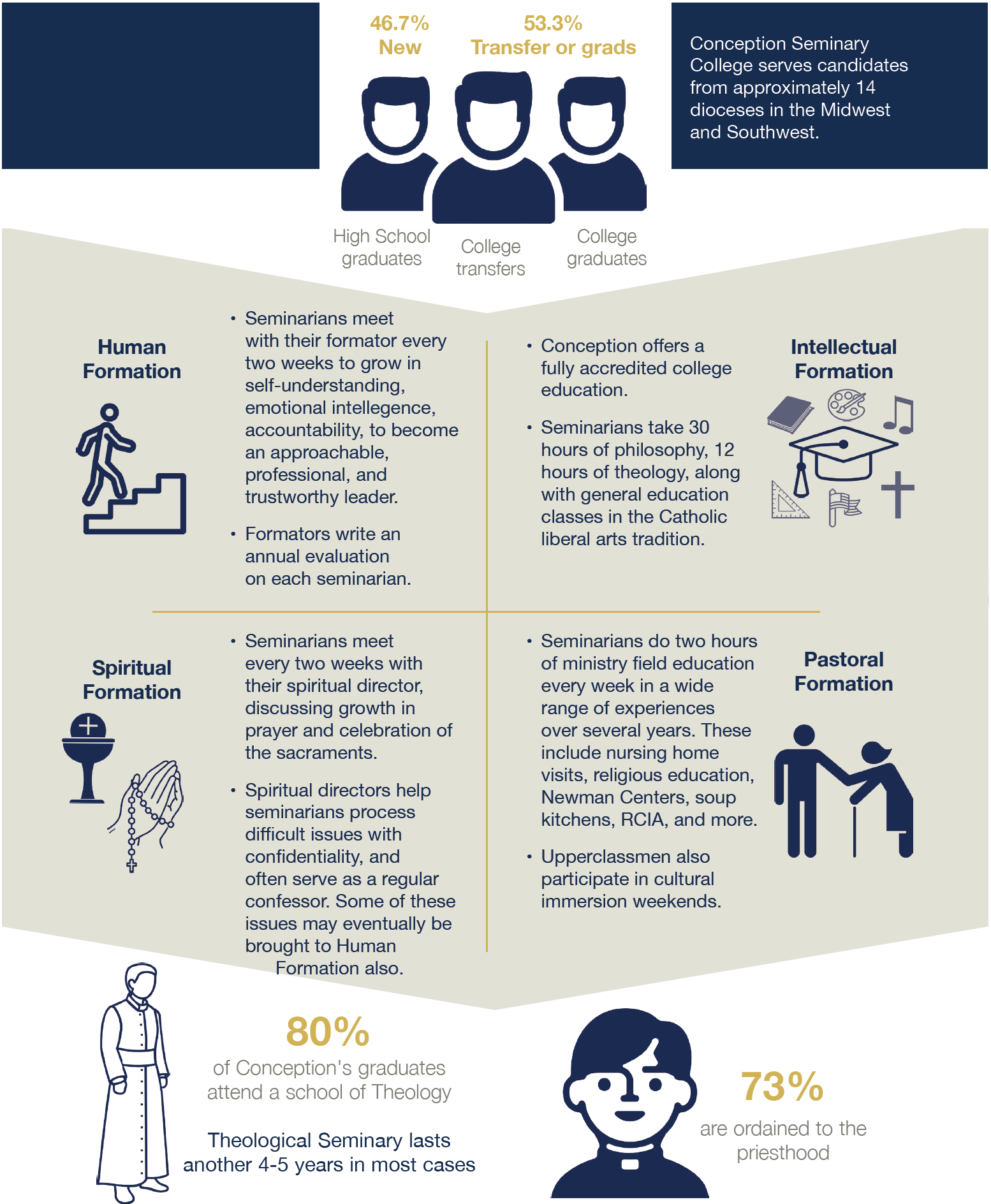What Role Does Conception Play in Forming a Priest?

Adapting to what holy Mother Church asks of us and what needs our seminarians present in every age has marked over a century of Conception Abbey’s work of preparing men to be parish priests.
Conception Seminary College is a school. We offer a fully accredited college program. However, that is only one-fourth of what we do at the seminary! Along with Intellectual Formation, there are Human Formation, Spiritual Formation, and Pastoral Formation. These are the necessary dimensions of seminary. For most undergraduates, this means three to four years; for those with a college degree who need 30 hours of philosophy and initial formation, this is two to three years.
You might ask why these other dimensions of priestly formation are necessary. Could not someone just apprentice with a priest? Consider the military. Do they give a man a weapon and drop him into a combat situation, saying, “You have what you need – you’ll figure it out?” Of course not! They put him in basic training where he can be tested and taught in a controlled environment with mentors who challenge, encourage, and sometimes have to weed out candidates. Only after being formed as soldiers are they sent into active combat.
The seminary is similar to basic training. Obviously, it is much longer. Part of that is due to the academic aspect, but also because there are greater nuances and longstanding habits that require more time in order for a man to be a successful priest.
— Fr. Pachomius Meade, OSB,
Dean of Students
Human Formation | Intellectual Formation | Spiritual Formation | Pastoral Formation

All seminaries are guided by one governing document
The sixth edition of the Program for Priestly Formation was approved in April 2022 by the Holy See. It is the U.S. bishops’ response to a document from the Vatican’s Congregation for the Clergy written in 2016. This is only the latest version of the guidance (the previous edition came out in 2001) that the Vatican asks the Church in particular regions to create, from which they implement directives and adapt suggestions to their particular institutions. The most recent edition includes some new “stages” of priestly formation that have caused a stir, as we who work in the field try to figure out how to prepare changes. For example, by Fall 2023 we will inaugurate the new “Propaedeutic Stage,” a new orientation phase, which will mark the first 12 months of seminary for all new seminarians, whether right out of high school, transferring from another college, or coming for initial formation already with a college degree.
[ A Deeper Look at Priestly Formation ]
Human Formation | A priest’s personality should not make people leave the Church—but we have probably all known priests that have driven people away. We cannot discount the human development of a seminarian. Processing experiences and receiving feedback in regards to how he presents himself—at meals, in the dorm, playing sports—the man comes to know himself and accept his strengths and weaknesses in a mature manner. Ordination imparts grace, but it builds on what is already there. Human Formation helps a man be relatable, professional, aware of how he comes off to others, able to know and cope with his emotions, a man who makes friends and builds community, and a man who is able to maximize strengths and minimize weaknesses.
Intellectual Formation | Most are surprised that undergraduate seminarians study philosophy. Why is that? Shouldn’t they simply study the Bible and Catechism and call it a day? The Church has repeatedly told us that the faith is reasonable. It is not enough to explain doctrine saying, “Because the Bible says so.” God gave us rational minds and is, in fact, Truth itself (cf. John 14:6). Likewise, St. Peter states: “Always be ready to give an explanation for your hope” (1 Peter 3:15).
I would also say, from pastoral experience, most big questions are not theological but rather philosophical (e.g., Why should I believe in God? Why do bad things happen to good people? Is there objective truth?). Thus, philosophy, along with math, science, history, and cultural appreciation, are servants to theology.
Spiritual Formation | This seems obvious, but a priest must be a man of prayer and have matured in the spiritual life enough to guide others. There is an old expression: “You can’t give what you don’t have.” Often men coming to seminary are undisciplined or treat prayer like earning God’s love rather than based in a relationship with a loving God. It is important that a man is faithful to prayer, Sacramental life (especially the Sacrament of Reconciliation), and has a wide knowledge of the Church’s treasury of spiritual writing.
Pastoral Formation | This is the practicum piece of formation. However, at the college level it is limited and often observational. A seminarian should get a wide range of experiences over the course of college. Moving to the graduate seminary after Conception, a man will have more intensive ministry preparation and experience. The three-fold process of priestly formation is self-knowledge, self-acceptance, and self-gift. At the undergraduate level, a seminarian utilizing the other Human, Spiritual, and Intellection Formation will be able to have achieved self-knowledge and self-acceptance, and ready in the next four years of seminary to give himself away in ministry.

